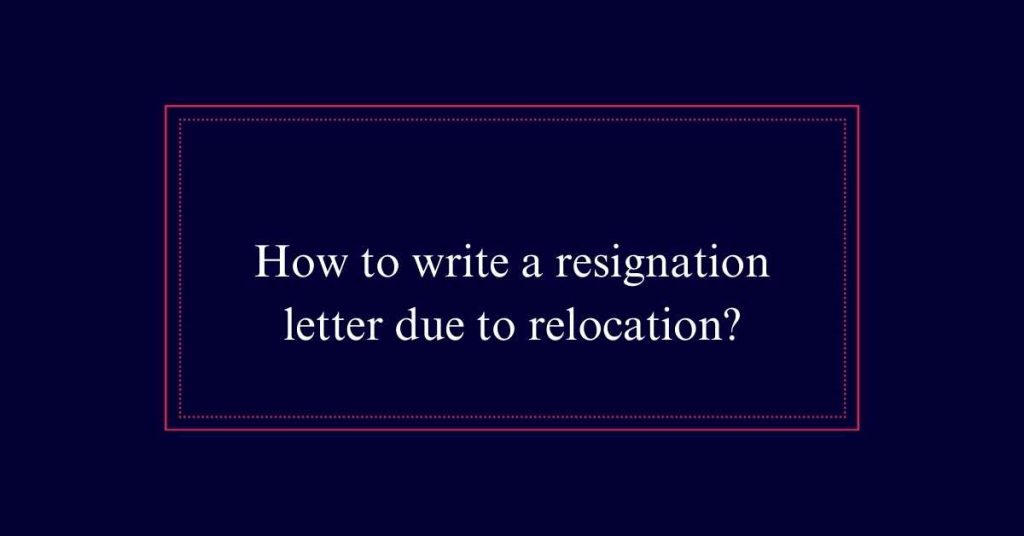How to write a resignation letter due to relocation?
When you’re relocating and need to resign, a proper resignation letter is essential. Start by stating your intention to resign and mention your relocation plans. Include your last working day, express gratitude for the opportunities, and offer to help with the handover.
Give at least two weeks’ notice to allow your employer to find a replacement. Keep your tone positive and professional. Verify all contact information and consider handing in your letter personally or by email with confirmation. This approach maintains your professional reputation and guarantees a smooth handover.
Importance of a Resignation Letter
Writing a resignation letter is essential because it formally communicates your intention to leave the company. It sets a clear departure timeline and records your decision officially. This helps prevent misunderstandings.
Your letter shows professionalism and respect for your employer. It maintains a positive relationship with your colleagues and management. Including key details like your last working day helps the company plan for your departure.
Offering to assist with the handover shows your commitment to a smooth transition. Expressing gratitude in the letter leaves a positive impression. A well-written resignation letter ensures a respectful and efficient exit process.
Understanding Notice Periods
Understanding how notice periods work is key to ensuring a smooth departure from your company. Notice periods are usually outlined in your employment contract. They give your employer time to find a replacement and organize the workflow. Typically, a two-week notice is standard, but some roles might require more time.
Here’s why honoring your notice period matters:
- It shows respect for your employer and colleagues.
- It helps maintain professional relationships.
- It allows for proper handover of your duties.
- It gives you peace of mind knowing you’ve done the right thing.
- It prevents potential legal issues.
Structuring Your Letter
When structuring your resignation letter due to relocation, start with a clear and concise opening. State your intent to resign and mention your relocation plans. Keep it brief but informative.
Next, include the date, your last working day, and the recipient’s name. Use short sentences for clarity.
After the opening, express gratitude for the opportunity and experiences you’ve had at the company. Be specific but keep it brief. This shows professionalism and appreciation.
Finally, offer your assistance in the changeover process. Mention how you can help train a replacement or complete pending tasks before leaving.
End the letter with your contact information and a polite closing.
Essential Components to Include
Your resignation letter needs several essential components to guarantee clarity and professionalism. Start with the date and the recipient’s name to set a formal tone.

Clearly state your intent to resign and mention your last working day. Express your gratitude for the opportunity and offer to help with the handover.
Here’s a quick checklist to make sure you hit all the right notes:
- Date: Shows when you wrote the letter.
- Recipient’s Name: Personalizes and directs the letter.
- Intent to Resign: Clearly states your decision.
- Last Working Day: Provides a clear timeline.
- Appreciation and Handover Offer: Leaves a positive impression.
Following these guidelines ensures your resignation letter is both professional and considerate.
Timing Your Notification
Providing timely notice of your resignation is crucial for a smooth handover. Aim to give at least two weeks’ notice, or follow the period specified in your contract. This notice allows your employer to start finding a replacement or redistributing your tasks. Check your contract for any specific requirements, as some roles may need longer notice periods.
Early notification reduces stress for everyone involved. Your team can plan better, and you can leave on good terms. Avoid waiting until the last minute to inform your manager. This can cause unnecessary strain and disrupt workflow.
Timing your resignation correctly guarantees a professional exit and maintains positive relationships with your colleagues and employer.
Maintaining Professionalism
Maintaining professionalism in your resignation letter is essential for leaving on good terms and preserving your professional reputation. Start with a polite and clear statement of your intent to resign. Express gratitude for the opportunities you’ve had at the company. Keep your tone positive and avoid negative remarks. Proofread your letter to make sure it’s free of errors.
Here’s why maintaining professionalism matters:
- Respect: Shows respect for your employer and colleagues.
- Opportunities: Keeps doors open for future opportunities.
- Reputation: Preserves your professional reputation.
- Smooth Handover: Facilitates a smoother handover process.
- Gratitude: Demonstrates gratitude for your experiences.
Offering Transition Assistance
After expressing gratitude and maintaining a positive tone, it’s important to offer help during your departure. This shows your commitment and eases the change for your team. You could assist in training your replacement, creating detailed handover documents, or staying available for questions after you leave. Here’s a simple table to guide your change offers:
| Task | Description | Benefit |
|---|---|---|
| Train Replacement | Teach new hire your duties | Smooth handover |
| Handover Document | Create detailed guides for your tasks | Helps new hire understand roles |
| Post-departure Help | Stay reachable for questions after leaving | Ensures ongoing support |
Expressing Gratitude
Expressing gratitude in your resignation letter highlights your appreciation for the opportunities and experiences you’ve had at the company. It’s important to show your thankfulness as you leave. A few heartfelt sentences can make a lasting impression.
You might want to mention specific aspects that made your time there special:
- Mentorship and guidance you received from your supervisors.
- Friendships and bonds you formed with colleagues.
- Skills and knowledge you gained that helped you grow.
- Opportunities for career advancement and learning.
- Support during challenging times, both professional and personal.
These points help convey your genuine appreciation. They also leave a positive note, showing that you’re grateful for your time at the company. This can help maintain good relationships even after you leave.
Submission Methods
You should know the best ways to submit your resignation letter to avoid any confusion. The most common method is to hand it in personally to your manager. This shows respect and allows for a direct conversation.
If in-person delivery isn’t possible, email is a convenient alternative. Make sure to request a read receipt or follow up to verify it’s received. Some companies may prefer an online submission through the HR portal. Always check your company’s policy for specific instructions.
Avoid sending your resignation letter through casual means like text or instant messaging. Using formal, approved channels confirms your resignation is documented correctly and professionally.
Sample Resignation Letter
Let’s look at a sample resignation letter to help you craft your own. Remember to keep it clear and professional. Here’s an example:
[Your Name]
[Your Address]
[City, State, ZIP Code]
[Email Address]
[Today’s Date]
[Recipient’s Name]
[Company’s Name]
[Company’s Address]
[City, State, ZIP Code]
Dear [Recipient’s Name],
I am writing to formally resign from my position at [Company’s Name] due to relocation. My last working day will be [Last Working Day].
I have enjoyed:
- Working with an amazing team.
- Professional growth opportunities.
- A supportive work environment.
- Valuable experiences.
- Meaningful projects.
Thank you for the support. I’m willing to assist during this transition period.
Best regards,
[Your Name]
[Contact Information]
Use this template to ensure you include all necessary elements.
Frequently Asked Questions
Can I Negotiate My Notice Period if I Need to Relocate Urgently?
Yes, you can negotiate your notice period if you need to relocate urgently. Speak with your manager as soon as possible, clearly explain your situation, and ask if they can accommodate a shorter notice period.
Should I Mention My New Location in the Resignation Letter?
Yes, you should mention your new location. It helps explain your reason for resigning and provides clarity. Keep it brief and professional, ensuring the main focus remains on your gratitude and the relocation process.
How Do I Handle Unused Vacation Days When Resigning?
Check your company’s policy on unused vacation days. Some companies will pay out unused days, while others may not. Discuss this with HR or your manager to understand your specific situation and options.
What if My Relocation Plans Change After Submitting My Resignation?
If your relocation plans change after submitting your resignation, inform your manager immediately. Discuss the new situation and see if you can keep your job. Companies often appreciate transparency and may accommodate changes if possible.
Are There Any Tax Implications for Resigning Due to Relocation?
Yes, there can be tax implications when you resign due to relocation. You might qualify for moving expense deductions, but you’ll need to meet specific IRS criteria. Check with a tax advisor for your specific situation.






